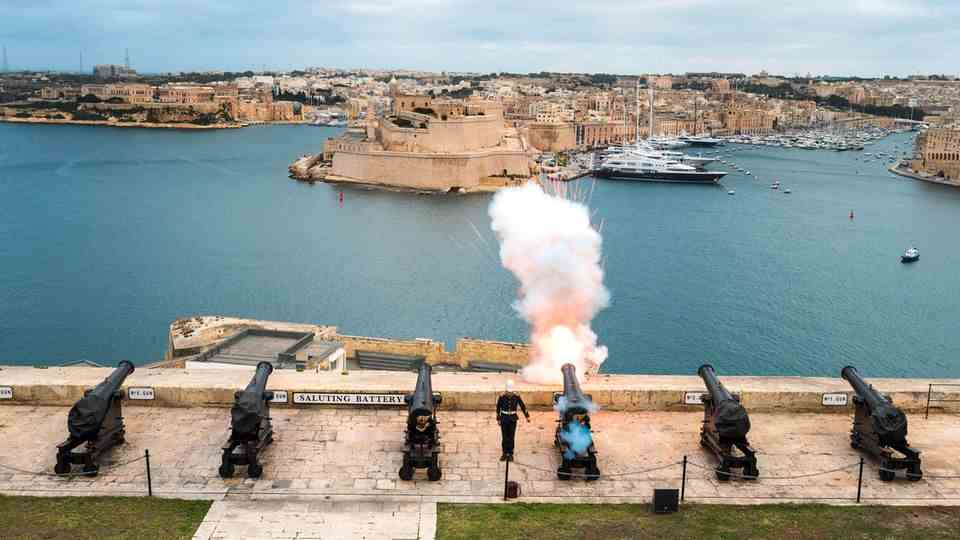Entry into Hamburg
China is already involved in these European ports – and it’s not just about the economy
Cosco container ship at Tollerort in the Port of Hamburg: What other interests apart from economic ones China is pursuing by entering the terminal remains nebulous for the time being.
© Jonas Walzberg / DPA
The entry of the Chinese mega-shipping company Cosco into a terminal in the port of Hamburg, which is now permitted, makes sense from an economic point of view. But: China’s influence on global maritime trade is growing a bit again. In Europe alone, the Chinese are already involved in a number of ports.
It’s just a terminal. And only at this one terminal in the port of Hamburg can the Chinese state-owned company Cosco now acquire 24.9 percent of the shares after approval by the federal government. That’s not too much of the entire Port of Hamburg, which according to the Hamburger Hafen und Logistik (HHLA) is 69 percent in the hands of the Free and Hanseatic City of Hamburg. The rest falls into so-called free float, and according to HHLA figures from December 31, 2021, none of the free float shareholders currently holds more than three percent in Germany’s largest port. This will not change with the entry of Cosco into the container terminal in Tollerort.
So too much excitement? Chancellor Olaf Scholz believes yes. Likewise, Hamburg’s head of government Peter Tschentscher, and even the second mayor of the Hanseatic city, Katharina Fegebank (Greens), has no major concerns, unlike her party friends at the federal level. “The question of how Europe, like Germany, will deal with China in the future and the concern about growing dependencies and influence is one that will not be decided on this issue,” says Fegebank. Like Tschentscher, she is concerned with the well-being of the Hanseatic city and the preservation of jobs. Because Hamburg’s port is struggling, according to current figures from the analysis company Alphaliner, it has lost another place in the global ranking and is therefore still in the top 20 of the world’s largest ports.
Dependence on China long since there
In view of this development, experts believe that, viewed in the light of day, the current decision already shows dependence on China. Cosco’s promise to prefer parts of its freight business via Hamburg if it has a stake in Tollerort is a poisoned offer. Because it can also be turned around: If Germany and Hamburg refuse to participate, then what is currently the second largest container shipping company in the world could also direct the flow of goods specifically past Hamburg. Hamburg’s direct competitors would be ideal: Rotterdam, Antwerp, Zeebrugge. It would be easy for Cosco, since the Chinese state-owned company already has shares in all these ports.
And that’s not even all holdings. According to estimates by the Kiel Institute for the World Economy (IfW), ten percent of Europe’s port capacities are already in Cosco’s, and thus in China’s, hands. The mega shipping company is said to already hold shares in 13 European ports, and the port of Piraeus is even completely under Chinese control. According to the company, these are the largest Cosco holdings in European ports:
- Piraeus (Greece): 100 percent
- Zeebrugge (Belgium): 90 percent
- Valencia (Spain): 51 percent
- Bilbao (Spain): 40 percent
- Antwerp (Belgium): 20 percent
- Vado Ligure (Italy): 40 percent at the Vado Reefer Terminal
- Vado Ligure (Italy): 40 percent of Vado Container Terminal
- Istanbul (Turkey): 26 percent at Kumport Terminal
- Rotterdam (Netherlands): 17.85 percent at the Euromax terminal
In addition, there are significant holdings in ports on almost every other continent: Egypt, Saudi Arabia, Singapore, South Korea, USA, Peru.
It’s not just about freight flows
As a result, Cosco, and with it China, is already in a position to direct the flow of cargo around the world and thereby exert both economic and political influence. Cosco stands for “both the so-called maritime and the digital Silk Road and thus for China’s influence on the control of geographical routes for maritime trade and its digital processing,” explains trade expert Rolf J. Langhammer from IfW Kiel in a statement on Cosco in Hamburg -Started. Langhammer warns that digital processing could allow Cosco to achieve a dominant position at the expense of other competitors. And he sees just the Hamburg example as proof that China is not only concerned with economic interests but also with strategic interests: “Promises to concentrate more cargo than before on Hamburg in return for the participation – should they have been given – [nährt] the suspicion of behavior not only oriented towards business goals. Market-oriented companies cannot promise something like that.”
Economic experts are indisputable that Cosco’s entry into the Hamburg terminal fits into the pattern of China’s drive to expand, which has been observed since the 1990s. At the latest under state and party leader Xi Jinping, the Middle Kingdom reversed the concept of “change through trade”, which finally failed with the Ukraine war. The “change” is supposed to take place in the system war with the West declared by Xi in favor of China and increase its influence in the world.
Steinmeier: Don’t trust in “change through trade” anymore
The principle of “change through trade” is something “that we can no longer trust in the future,” stated Federal President Frank-Walter Steinmeier accordingly in an interview with ARD “Tagesthemen” on Tuesday evening. “We all have to live with this disappointment.” Steinmeier continued: “For the future, that means we have to learn lessons (…), we have to reduce one-sided dependencies wherever possible, this also applies to China in particular,” said Steinmeier. He emphasized that it was important to talk “more intensively” with China’s neighbors. Although these cannot replace trade relations with China, the relationship with Southeast Asia can be rebalanced.
Sources: Business Insider; Hamburg port and logistics; Mehrcontainerfürdeutschland.de; Kiel Institute for the World Economy; daily topics



